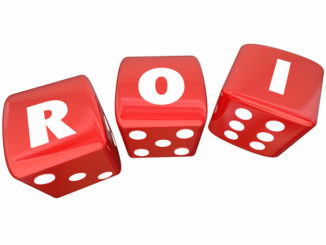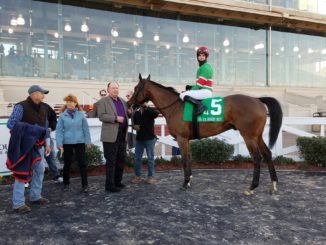
Brisnet Betting Guide Exclusive by Ren Carothers
This column appears in this week’s edition of the Brisnet Betting Guide.
Find more quality content available at a participating track near you!
Now available at Aqueduct and NYRA meets!
“C’mon! It’s just two dollars.”
I was over a month away from my 10th birthday, but despite the passage of time, I still recall reflexively bristling and crossing my arms with disdain as my father encouraged me to let him place a wager on my behalf at Detroit Race Course on a horse I was certain had no chance. The bettors agreed.
I furrowed my brow and motioned to the track monitor, arguing, “She’s 50-1, Dad!”
He found this amusing. I was only nine, but, having learned to read past performances before Dr. Seuss, already a cynic. So, he changed tactics and appealed to my sense of loyalty.
“Don’t you want to show your support? We bred her. She’s named after your cousin. How can you not bet her?”
It was true. The 3-year-old filly in question was a homebred of ours, named after my cousin, Sahar, who was more like a sister to me. My parents had liked this daughter of Rustic Ruler and our herd matriarch, Miss Hayday, enough to honor her with the title before privately selling her as a yearling. Still, I was a shrewd child when it came to betting the ponies. Two dollars could go toward a soft serve ice cream, or a pack of trading cards in the gift shop. Was I really going to let sentiment part me with my bankroll?
Both Sahars were beautiful, but whereas the human counterpart was delicate and feminine, the equine, an attractive bay with a star and three small socks with ermines, was a big mamoo, who could even intimidate the boys in the field as a youngster. Undoubtedly, it was her physical presence that caught the attention of a buyer who was scouting out yearlings for a client. After her purchase, she began training with her new owner’s small roster, but proved difficult to manage, and was consequently sold for a pittance to a trainer from England named Dennis Schofield, who put the filly in his children’s names.
Sahar made her debut at two, going off at 55-1 in a 6-furlong, $16,000 maiden claimer, finishing fifth, beaten 10 1/2 lengths. In her second attempt, curiously stepped up in a maiden special weight, she crossed the wire eighth, 9 1/2 lengths back. Now, here the 3-year-old was, entered in a $50,000 maiden claimer going 5 furlongs, heading postward with her third jockey in as many races.
“Two dollars…,” my dad teased as he grinned in encouragement.
My father had never denied me anything, nor had he ever steered me wrong. He always had my best interests at heart. Was it really such a momentous request he was making of me now? It was only two dollars, after all, and he had taken much bigger gambles throughout his life and won, including immigrating from Iraq as a teenager.
While he hailed from a prominent family, they didn’t want him to leave and he made the leap with little assistance. He proved the decision sound, however. He graduated college with a Masters of Business
Administration, and not long after that, took another gamble in asking my mother, who he always claimed was his Marilyn Monroe, out on a date. Together, they made another roll of the proverbial dice, buying 80 acres of land and a couple of Thoroughbred horses. My mother’s love of them had been seeded by her own father, an ardent racing fan who would tell her stories of horses like Black Gold. He had always wanted to be an owner, but passed before that hope could be realized. My dad’s adoration for my mother enabled her to honor her own father in this way.
Three days after my birth, a filly they would name Exceedian (also by Rustic Ruler) was foaled and, later, privately purchased. She would go on to win 19 of 40 starts, finishing no worse than second or third on nine other occasions, and was named champion mare of 1984 in Michigan.
My father would take even bigger gambles later in life, the greatest being risking his own neck to go back to the country of his birth after the fall of Baghdad. He chose to return to try and restore some sense of peace in what had once been the cradle of civilization. For years, he sacrificed having a life safe within U.S. borders with his family to try to better the lot of those less fortunate as a cultural advisor.
This position led to meetings with officers of the highest ranking and world leaders from across the Middle East. It also came with the solemn mission of standing up against the pervasive evils of terrorism that threatened to lay waste to all decency across the country, including in his hometown: Tel Kaif, Mosul, in the Nineveh plains, once the capital of the Assyrian Empire. There, Christians, rooted as some of the oldest in the region, were being driven out into diaspora, their doors marked.
When I was married in 2014, my father took yet another gamble and made the harrowing trip to be there to walk me down the aisle to a man he hadn’t had the opportunity to get to know. He trusted me, though. He hadn’t raised a girl lacking in self-confidence or good judgment.
When he eventually retired from his post in 2015, just shy of 78, he was honored for his service and given a plaque, which reads in part:
“Your support of the Senior Advisors Group and the overall OSC-I mission has been outstanding. Across thousands of Key Leader Engagements, you have been at the epicenter of policy-making at the highest levels of the Iraqi government and U.S. leadership, supporting freedom and democracy for the Iraqi people and furthering vital American interests. This tour culminates over twelve years of dedicated, brave, and loyal service…through some of the most dangerous times in Iraq. You should be extremely proud of your service.”
He never boasted of his bravery or accomplishments, though he had unquestionably changed so many lives for the better, irrespective of the current state of Iraq. In that light, he had won…
But I sit here now, reflecting on all this, mourning his loss. The mission in Iraq, which included being present in areas in which munitions were burned, led to his cancer. On Jan. 27, my mother told me the news of his passing, bringing me to my knees in agony.
Agony.
That kind of pain is debilitating. You balk from trying to move forward, lest you leave your connection behind. It feels like a betrayal to smile, an affront to laugh. Yet, I know, it is I alone who deems these emotions as treasonous.
My father would not want me to languish. My memories of him and his Hollywood smile won’t fade as new ones are made. He remains timeless even as the world continues to turn on its axis, as winter melts away in acquiescence to spring.
I can still see that charismatic spark in his eyes with absolute clarity as he cajoled me all those years ago, “Just two dollars.”
I didn’t want to. I really, really didn’t want to, but this man had never failed me. I had to trust. He had never given me any reason not to. So, with a roll of the eyes, I relented. “Fiiine. Two dollars.”
Triumphantly, my dad walked off to the windows to get my ticket.
Sahar left the gate that afternoon at 54-1 with René Douglas in the irons. He guided her to a half-length victory, narrated by track announcer Sam McKee, leaving me, and the betting public, in astonishment. The big bay mare, whose trainer had afforded her the opportunity to mature, rewarded her conditioner, and us, by blossoming into a regional star.
Over the course of her career, this eventual two-time champion mare won 14 of 49 starts, with six seconds and nine thirds, scoring from 5 furlongs to a mile and an eighth. She won on fast going and in the slop. She followed up a score in the six-furlong Ann Arbor S. with a three-length win in the Plymouth. She won the Michigan Oaks, and the Moonbeam and Farer Belle Lee Handicaps.
Sam McKee, whose loss is still felt, once referred to Sahar as “probably the classiest Michigan-bred filly and mare we have,” and in researching her old stats, I came across a post on a forum from someone who once frequented DRC, who named her – ahead of Beau Genius – as a horse he remembered from those days.
My own daughter, Ava, the grandchild my father had prayed for, carries Sahar as her middle name. True, this is in honor of the human Sahar, but the equine serves as a point of inspiration, as well.
Two dollars…$110.20…and a lesson in faith to last a lifetime won.
Thanks, Dad. I love you, always.




Great Thread !!!!